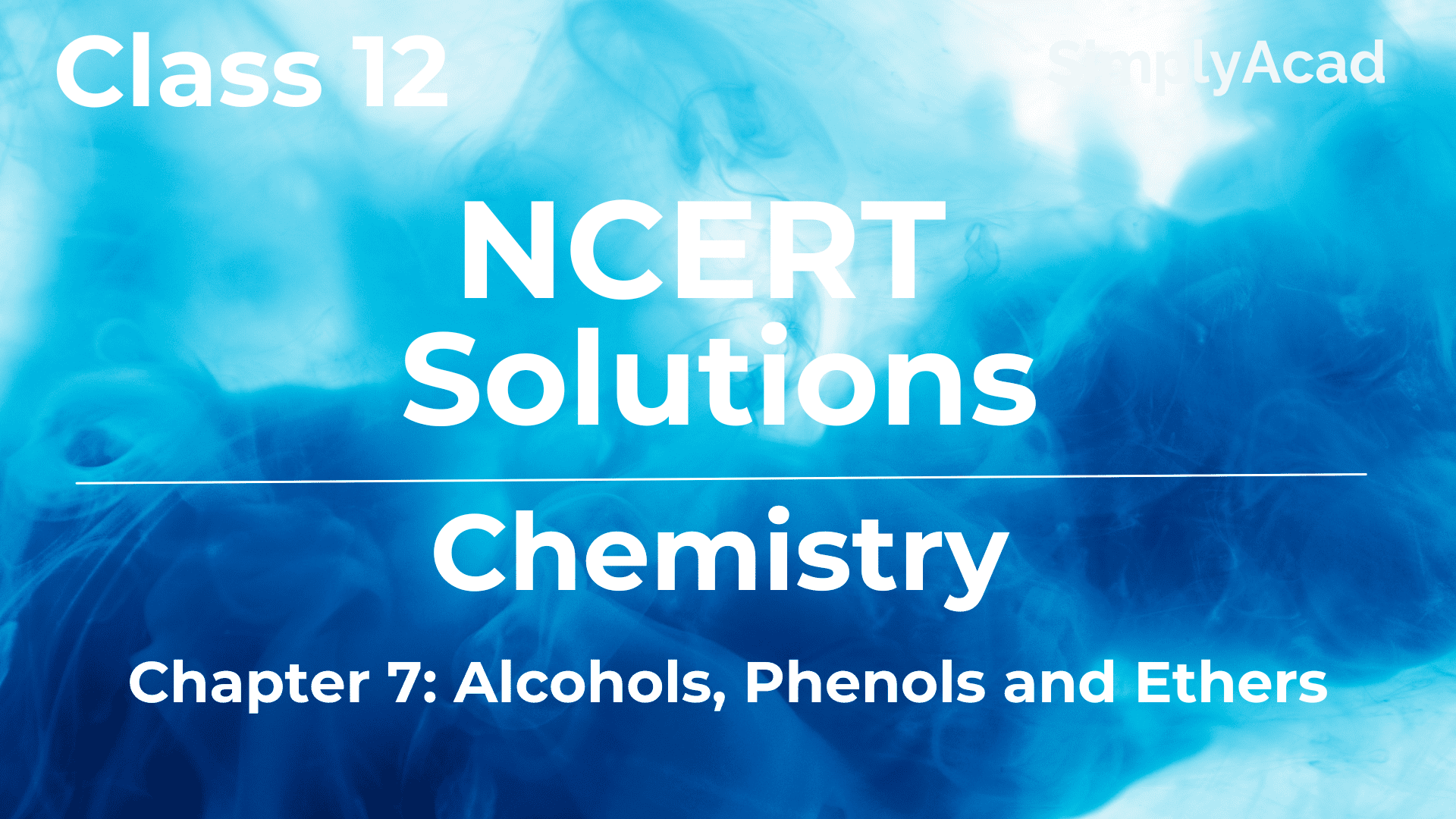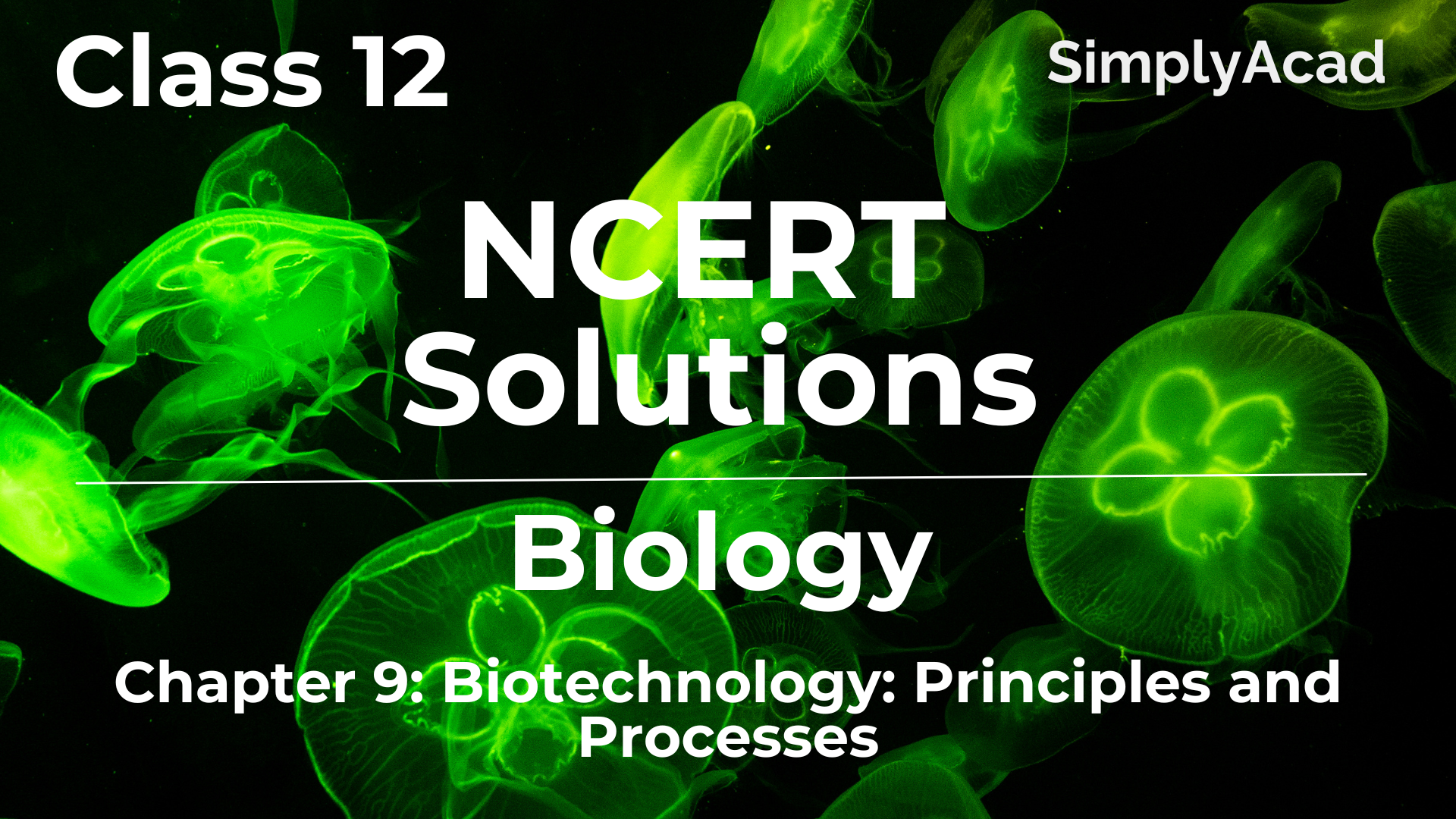NCERT Exemplar Class 12 Biology Chapter 8 Human Health And Diseases
Class 12 Biology: NCERT Exemplar for Human Health and Disease – Your Key to Exam Success
Exemplar class 12 biology Chapter 8 Human Health and Disease is an invaluable resource for students aiming to deepen their understanding of this crucial chapter. It offers a comprehensive exploration of the topics covered in the Class 12 Science syllabus, specifically in Chapter 8: Human Health and Diseases. Crafted by top subject matter experts at SimplyAcad, this exemplar helps students thoroughly cover all sections of the chapter. Furthermore, it includes a variety of question types—MCQs, very short answer, short answer, and long answer—specifically tailored for this chapter, helping students become more familiar with different question formats. By practicing these questions, students can significantly enhance their exam preparation and perform exceptionally well in their 12th board examinations.
For those seeking more in-depth learning resources on Class 12 Biology Human Health and Disease, the NCERT website and SimplyAcad offer detailed exemplars for all chapters in the Class 12 Science syllabus. These resources provide valuable study materials and additional practice questions, enabling you to excel in your exams.
Key Benefits of Using the Exemplar class 12 biology Chapter 8 Human Health and Disease
- Comprehensive Coverage: This exemplar ensures that all critical areas of the Class 12 Biology Human Health and Disease chapter are thoroughly covered, helping students grasp the essential concepts.
- Variety of Question Types: The exemplar includes a diverse range of practice questions—MCQs, very short, short, and long answer types—specifically designed for Class 12 Biology Human Health and Disease.
- Prepared by Experts: Developed by leading subject matter experts, the exemplar aligns with the latest syllabus, ensuring high-quality content.
- Easily Accessible: Students can access these exemplars from SimplyAcad, along with other valuable resources, for additional support.
Access the NCERT Exemplar class 12 biology Chapter 8 Human Health and Disease
MCQ Type Questions: NCERT Exemplar class 12 biology Chapter 8 Human Health and Disease Question 1 to 10
Question 1: The term ‘Health’ is defined in many ways. Which of the following is the most accurate definition of health?
a) Health is the state of body and mind in a balanced condition.
b) Health is the reflection of a smiling face.
c) Health is a state of complete physical, mental, and social well-being.
d) Health is a symbol of economic prosperity.
Solution: Option (c) is correct.
Question 2: The organisms that cause diseases in plants and animals are called:
a) Pathogens
b) Vectors
c) Insects
d) Worms
Solution: Option (a) is correct.
Question 3: Which clinical test is used for the diagnosis of typhoid?
a) ELISA
b) ESR
c) PCR
d) Widal
Solution: Option (d) is correct.
Question 4: Diseases are broadly grouped into infectious and non-infectious diseases. Identify the infectious diseases from the list below:
i) Cancer
ii) Influenza
iii) Allergy
iv) Smallpox
a) i and ii
b) ii and iii
c) iii and iv
d) ii and iv
Solution: Option (d) is correct.
Question 5: The sporozoites that cause infection when a female Anopheles mosquito bites a person are formed in:
a) The liver of the person
b) RBCs of the mosquito
c) Salivary glands of the mosquito
d) The gut of the mosquito
Solution: Option (d) is correct.
Question 6: The disease chikungunya is transmitted by:
a) Housefly
b) Aedes mosquito
c) Cockroach
d) Female Anopheles
Solution: Option (b) is correct.
Question 7: Many diseases can be diagnosed by observing the symptoms in the patient. Which group of symptoms indicates pneumonia?
a) Difficulty in respiration, fever, chills, cough, headache
b) Constipation, abdominal pain, cramps, blood clots
c) Nasal congestion and discharge, cough, constipation, headache
d) High fever, weakness, stomach pain, loss of appetite, and constipation
Solution: Option (a) is correct.
Question 8: Cancer-causing genes are called:
a) Structural genes
b) Expressed genes
c) Oncogenes
d) Regulatory genes
Solution: Option (c) is correct.
Question 9: In malignant tumors, the cells proliferate, grow rapidly, and move to other parts of the body to form new tumors. This stage of the disease is called:
a) Metagenesis
b) Metastasis
c) Teratogenesis
d) Mitosis
Solution: Option (b) is correct.
Question 10: When a healthy person is diagnosed as unhealthy by a psychiatrist, the reason could be that:
a) The patient was not efficient at work
b) The patient was not economically prosperous
c) The patient shows behavioral and social maladjustment
d) The patient does not take an interest in sports
Solution: Option (c) is correct.
MCQ Type Questions: NCERT Exemplar class 12 biology Chapter 8 Human Health and Disease Question 11 to 23
Question 11: Which of the following is the reason(s) for Rheumatoid arthritis? Choose the correct option.
i) The ability to differentiate pathogens or foreign molecules from self-cells increases.
ii) The body attacks self-cells.
iii) More antibodies are produced in the body.
iv) The ability to differentiate pathogens or foreign molecules from self-cells is lost.
a) i and ii
b) ii and iv
c) iii and iv
d) i and iii
Solution: Option (b) is correct.
Question 12: AIDS is caused by HIV. Among the following, which one is not a mode of transmission of HIV?
a) Transfusion of contaminated blood
b) Sharing infected needles
c) Shaking hands with an infected person
d) Sexual contact with infected persons
Solution: Option (c) is correct.
Question 13: ‘Smack’ is a drug obtained from the:
a) Latex of Papaver somniferum
b) Leaves of Cannabis sativa
c) Flowers of Dhatura
d) Fruits of Erythroxylum coca
Solution: Option (a) is correct.
Question 14: The substance produced by a cell in a viral infection that can protect other cells from further infection is:
a) Serotonin
b) Colostrum
c) Interferon
d) Histamine
Solution: Option (c) is correct.
Question 15: Transplantation of tissues/organs often fails due to the rejection of such tissues/organs by the patient. Which type of immune response is responsible for such rejections?
a) Auto-immune response
b) Humoral immune response
c) Physiological immune response
d) Cell-mediated immune response
Solution: Option (d) is correct.
Question 16: Antibodies present in colostrum, which protect the newborn from certain diseases, are of:
a) IgG type
b) IgA type
c) IgD type
d) IgE type
Solution: Option (b) is correct.
Question 17: Tobacco consumption is known to stimulate the secretion of adrenaline and noradrenaline. The component causing this could be:
a) Nicotine
b) Tannic acid
c) Curamin
d) Catechin
Solution: Option (a) is correct.
Question 18: Antivenom against snake poison contains:
a) Antigens
b) Antigen-antibody complexes
c) Antibodies
d) Enzymes
Solution: Option (c) is correct.
Question 19: Which of the following is not a lymphoid tissue?
a) Spleen
b) Tonsils
c) Pancreas
d) Thymus
Solution: Option (c) is correct.
Question 20: Which of the following glands is large-sized at birth but reduces in size with aging?
a) Pineal
b) Pituitary
c) Thymus
d) Thyroid
Solution: Option (c) is correct.
Question 21: Haemozoin is a:
a) Precursor of hemoglobin
b) Toxin released from Streptococcus-infected cells
c) Toxin released from Plasmodium-infected cells
d) Toxin released from Haemophilus-infected cells
Solution: Option (c) is correct.
Question 22: Which of the following is not the causal organism for ringworm?
a) Microsporum
b) Trichophyton
c) Epidermophyton
d) Microsporum
Solution: Option (d) is correct.
Question 23: A person with sickle cell anemia is:
a) More prone to malaria
b) More prone to typhoid
c) Less prone to malaria
d) Less prone to typhoid
Solution: Option (c) is correct.
Very Short Answer Type Questions: NCERT Exemplar class 12 biology Chapter 8 Human Health and Disease Question 1 to 5
Question 1: Certain pathogens are tissue/organ-specific. Justify this statement with suitable examples.
Solution: Certain pathogens target specific tissues or organs in the body. For example, Salmonella typhi specifically infects the small intestine, leading to typhoid.
Question 2: The immune system of a person is suppressed. In the ELISA test, they tested positive for a pathogen.
a) Name the disease the patient is suffering from.
b) What is the causative organism?
c) Which cells of the body are affected by the pathogen?
Solution:
a) The patient is suffering from Acquired Immunodeficiency Syndrome (AIDS).
b) The causative organism is the Human Immunodeficiency Virus (HIV).
c) The cells affected by the pathogen are Helper T-cells.
Question 3: In which way has the study of biology helped us to control infectious diseases?
Solution: The study of biology has led to the development of various medicines and vaccines, allowing us to control infectious diseases. For example, antibiotics like penicillin and vaccines like the polio vaccine have been instrumental in reducing the incidence of these diseases.
Question 4: What is the basic principle of vaccination? How do vaccines prevent diseases?
Solution: Vaccination is based on the principle of introducing a weakened or inactive form of a pathogen to the body, stimulating the immune system to produce antibodies. This prepares the immune system to fight the actual pathogen if exposed in the future, thereby preventing the disease.
Very Short Answer Type Questions: NCERT Exemplar class 12 biology Chapter 8 Human Health and Disease Question 6 to 10
Question 5: What measures would you suggest for the prevention and control of communicable diseases?
Solution: Measures to prevent and control communicable diseases include vaccination, maintaining hygiene, using proper sanitation, and educating people about the transmission methods and symptoms of these diseases.
Question 6: If a person shows symptoms of vomiting, body pain, breathlessness, and loss of vision, would you call these symptoms of a disease? Justify your answer.
Solution: Yes, these symptoms could indicate a disease, as they represent an abnormal functioning of the body, possibly due to an infection or other medical condition.
Question 7: How do vectors like mosquitoes play an important role in the transmission of diseases?
Solution: Vectors like mosquitoes transmit diseases by carrying pathogens from one host to another. For example, mosquitoes transmit malaria by transferring Plasmodium from infected individuals to healthy ones.
Question 8: Why are steroids used to treat inflammatory conditions? Give an example of a steroid.
Solution: Steroids are used to treat inflammatory conditions because they suppress the immune system, reducing inflammation and swelling. An example of a steroid is prednisone.
Question 9: Why does a patient suffering from AIDS lose immunity?
Solution: A patient suffering from AIDS loses immunity because the HIV virus specifically targets and destroys Helper T-cells, which are crucial for the immune system’s response to infections.
Question 10: What is metastasis?
Solution: Metastasis is the process by which cancer cells spread from the original tumor site to other parts of the body, forming new tumors.
Short Answer Type Questions: NCERT Exemplar class 12 biology Chapter 8 Human Health and Disease
Question: What are the various routes by which transmission of human immunodeficiency virus takes place?
Solution: HIV can be transmitted through unprotected sexual contact with an infected person, sharing needles, transfusion of contaminated blood, and from mother to child during childbirth or breastfeeding.
Question: If a person is suffering from chickenpox, how can you prevent the spread of the disease?
Solution: To prevent the spread of chickenpox, the infected person should be isolated, avoid sharing personal items, maintain hygiene, and people in contact with them should be vaccinated.
Question: The following table shows the infectious diseases and their causative organisms. Complete the table by filling in the blanks.
| Disease | Causative Organism |
|---|---|
| Diphtheria | Corynebacterium diphtheriae |
| Whooping Cough | Bordetella pertussis |
| Cholera | Vibrio cholerae |
| Typhoid | Salmonella typhi |
| Tuberculosis | Mycobacterium tuberculosis |
Question: How does cancer differ from a common disease?
Solution: Cancer differs from common diseases because it involves uncontrolled cell growth, which can invade and destroy surrounding tissues and spread to other parts of the body (metastasis), whereas common diseases usually have a limited and localized effect.
Question: In which way has the study of biology helped us to control infectious diseases?
Solution: The study of biology has enabled us to understand the mechanisms of infectious diseases, leading to the development of vaccines, antibiotics, and other treatments that have significantly reduced the incidence and severity of these diseases.
Long Answer Type Questions: NCERT Exemplar class 12 biology Chapter 8 Human Health and Disease
Question: Explain the following giving reasons:
a) Balanced diet is necessary for maintaining a healthy body.
b) Health of an organism depends upon the surrounding environmental conditions.
c) All parasites are pathogens, but all pathogens are not parasites.
d) Health is a state of physical, mental, and social well-being.
Solution:
a) A balanced diet provides all the essential nutrients required for the body to function properly, maintain energy levels, and support growth and repair.
b) Environmental conditions such as air and water quality, hygiene, and living conditions affect an organism’s health by either supporting or challenging the immune system.
c) Parasites are organisms that live on or in a host and can cause harm, making them pathogens. However, not all pathogens are parasites, as pathogens can also include bacteria and viruses that do not necessarily have a parasitic relationship.
d) Health is defined as a state of complete physical, mental, and social well-being, not just the absence of disease. This comprehensive definition encompasses the overall quality of life and the ability to function effectively in daily activities.
Conclusion: By leveraging the NCERT Exemplar for Class 12 Biology Human Health and Disease, students can thoroughly prepare for their board exams. This comprehensive resource, with its variety of questions and expert guidance, ensures that students are well-equipped to tackle any challenge in their Biology exam.
latest video
news via inbox
Nulla turp dis cursus. Integer liberos euismod pretium faucibua





